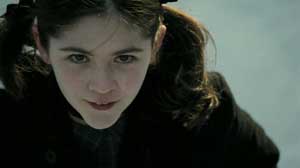 Warner Bros. Pictures/Dark Castle Entertainment
Warner Bros. Pictures/Dark Castle Entertainment
123 min., dir. by Jaume Collet-Serra with Peter Sarsgaard, Vera Farmiga, and Isabelle Fuhrman
There are plenty of imperfect films out there that I enjoy for the simple reason I am able to ignore their flaws, as they are usually few and far between. But for one to enjoy Orphan, the film that tells of a family adopting an ominous nine-year-old Russian girl, one must ignore a lot. A whole lot.
Related Posts
For starters, ignore the fact that you once saw a little movie called The Good Son. In fact, forget that movie exists completely. So when Orphan utilizes a dangerously high tree house, a thinly iced body of water, an intentionally caused car accident, a child shooting a firearm at an animal, and one sibling sneaking into a hospital room to smother another, you won’t be left wondering how so many scenes could be blatantly removed from one movie and transplanted into another. And you’ll be able to join the hordes of fans who have done the same and label this film as “original.”
Now, if you happened to catch another “evil child” movie entitled Joshua, suppress that memory as well. This might prove to be a bit more difficult, since Joshua was released only two years prior to Orphan and both starred Vera Fermiga in an identical role: a troubled mother whose sanity is questioned due to the spurring of a diabolical youngster. True, Fermiga does a respectable job in both cases (and along with Isabelle Fuhrman, carries Orphan on her back), but how impressed can one really be with a repeat performance? But to be fair, I would’ve said the same thing about Jack Nicholson if he had played a man driven crazy by a haunted house a year or two after The Shining debuted.
The shaky pedestal on which Orphan stands is unarguably its twist ending. It alone serves as the source of so many viewers’ praise of the film’s originality, and I’ll admit I can’t think of another film that uses its final plot point. However, in order for the twist to truly work, one must again ignore key plot holes which occurred earlier in the movie. A truly great twist is one that allows the viewer to watch the film a second time and have fun realizing that the house of cards never falls (i.e., we never saw Bruce Willis interact with anyone other than Haley Joel Osmond). But a single cheat turns a brilliant execution into a good try, hence the end result of Orphan: a film that, upon reflection, leaves you shaking your head at the disregard of the integrity its own plot structure.
What you shouldn’t ignore is young newcomer Isabelle Fuhrman’s portrayal of Esther, the sinister adoptee. Except for the times when Esther is inexplicably physically overpowering adult characters, Fuhrman brings a chilling realism to the screen. It actually angers me that such a talented young actress couldn’t have made her breakthrough with a better script, but at least the film’s literally laughable lines were given to other cast members, leaving Fuhrman’s performance unsullied.
And behind every good acting display is strong direction, this task belonging to one Jaume Collet-Serra. If only Collet-Serra had toned it down on the incredibly predictable “false” scares we’ve seen over and over in horror films, then I could’ve given him more credit. Multiple scenes using the rising scary music for the umpteenth time to conclude with an “Oh! It’s only you” moment only proves that Collet-Serra has seen a horror flick before but doesn’t necessarily understand the genre. Though I will say his visual use of black light in this film is one of the more interesting effects I’ve seen in recent theater outings.
But ignoring so much that I have mentioned (and a lot I have not, including how Esther can threaten her deaf sister by whispering into her ear) is just too much for me. And for a horror film that is commonly referred to as “psychological,” I find it odd that it doesn’t take too much contemplation to bring light to its shortcomings. I know there are those who liked this movie, Roger Ebert being one of them (despite his fellow critics at Variety, The New York Times, and Entertainment Weekly all disagreeing). How they saw past the clichés, obvious rip-offs, and weak writing? Who knows. Maybe I just see too many movies.